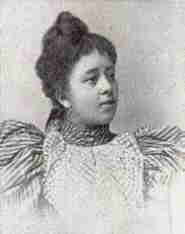 Lutie Lytle Lutie Lytlethe
third African-American woman to be licensed to
practice law
Lutie Lytle was born in
Murfreesboro, Tennessee, in 1871. Her family
moved to Topeka, Kansas, about 1882, and she
attended the public schools there.
Lutie's father was active in
the Populist Party and ran an unsuccessful
campaign for city jailer. His involvement led to
Lutie's appointment as the Populist's assistant
enrolling clerk for the State Legislature. She
also worked for one of the African-American
newspapers in Topeka, and it was while engaged in
this pursuit that she first dreamt of studying
law.
At the age of 21, Lutie moved
to Chattanooga, Tennessee, where she taught
school to pay for her tuition at Central
Tennessee College in Nashville. She studied hard,
and on September 8, 1897 was admitted to the
Criminal Court in Memphis -- the first
African-American woman to be licensed to practice
in Tennessee, and only the third in the United
States. Returning to Kansas later that same
month, she became the first African-American
woman to be admitted to the Kansas bar. In
addition, at the time she was admitted to the
Tennessee and Kansas bars Lytle was the only
black female to be practicing law, as both of the
first two to be licensed were deceased.
Now that she had overcome
racial and gender obstacles to receive her law
degree and license, Lytle faced an even more
difficult task: that of deciding where to
practice. Knowing that it would be all but
impossible for her to get clients in either
Tennessee or Kansas, she spent several months
giving lectures to women's groups and local
colleges on topics such as the law of Domestic
Relations.
In the Fall of 1898, Lytle
temporarily abandoned her plan to practice law
and joined the faculty at Central Tennessee
College, becoming the only woman law instructor
in the world. She served in that position through
the 1899 term.
Sometime after leaving Central
Tennessee, Lytle married a minister in the
African Episcopal Church and moved with him to
New Paltz, New York. She later married Alfred C.
Cowan, himself a lawyer, and moved to Brooklyn,
New York. In 1913, Lytle and her husband attended
the annual convention of what is now known as the
Negro Bar Association. She subsequently became
the first African-American woman to become a
member of a national bar organization.
Little else is known about
Lutie Lytle's life and career. Although it is
assumed that she practiced law in New York, no
conclusive evidence of that assumption exists.
Nor is it known when or where she died.

Connolly, Noreen R. "Attorney
Lutie A. Lytle: Options and Obstacles of a Legal
Pioneer." The Nebraska Lawyer,
January 1999; pp. 6-12.
Questions or comments about
this page?
|



